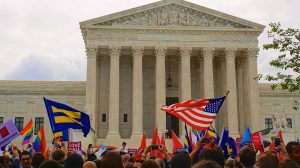

In a 1993 interview with The Washington Lawyer, Mindy Daniels, an attorney and LGBTQ activist, described what change would look like to her. “Being able to walk down the street, holding my partner’s hand and not fearing for my life.” Sometimes it is easy to forget how far we have come, but the Rainbow History Project (RHP) is here to help us remember. RHP has an ever-growing collection of documents, oral histories, and ephemera from the LGBTQ community in D.C., Maryland, and Virginia. Among the many collections are materials detailing the struggle for marriage equality.
The materials donated by Mindy Daniels, a past-president of the Gay and Lesbian Activists Alliance (GLAA), provide an excellent example. Daniels came to D.C. in 1976, began working on social justice issues and became active with GLAA. By 1990, she was its president and a civil rights attorney, engaging in pro bono work on behalf of the LGBTQ community. On June 11, 1992, the Health Benefits Expansion Act became effective. Importantly, it permitted same-sex couples to register as domestic partners. Subsequently, Congress enacted a budget-rider preventing the D.C. government from using government funds to implement the Domestic Partnership Registry.
 Daniels drafted a form requiring only a certified mail return receipt as proof of valid registration. Moments before the defunding order took effect, Mayor Sharon Pratt incorporated the form into an executive order. The form’s genius design complied with the congressional funding ban, while ensuring the registry’s continued legal effect. The funding ban continued to prohibit the D.C. government from offering employee health and benefits coverage provided for by the law. However, another provision, which did not require funding, gave domestic partners priority in hospital visitation. Visitation was often denied to partners by the hospital or a family member, even at death. This was an important right, especially at a time when the AIDS virus was ravaging the community.
Daniels drafted a form requiring only a certified mail return receipt as proof of valid registration. Moments before the defunding order took effect, Mayor Sharon Pratt incorporated the form into an executive order. The form’s genius design complied with the congressional funding ban, while ensuring the registry’s continued legal effect. The funding ban continued to prohibit the D.C. government from offering employee health and benefits coverage provided for by the law. However, another provision, which did not require funding, gave domestic partners priority in hospital visitation. Visitation was often denied to partners by the hospital or a family member, even at death. This was an important right, especially at a time when the AIDS virus was ravaging the community.
Ms. Daniels’ contributions are only a fraction of our incredible collection. For instance, in 1975, D.C. City Council Member Arrington Dixon introduced legislation to legalize same-sex marriage. RHP has made available a report of a meeting of the Gay Activists Alliance of DC discussing the bill and with whom to partner to rally for its passage.
The marriage equality battle has been one of our community’s greatest successes. RHP is mapping the terrain of that fight over decades in the DMV area. If you are interested in the history of this struggle, donating materials to the archive, or volunteering to track our history, please visit our website: www.rainbowhistory.org.
Highlights from our archive are publicly available online via our website and the entire archive is physically available at our archival partner, The Historical Society of Washington, D.C.
Save